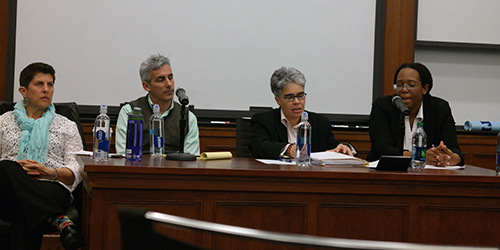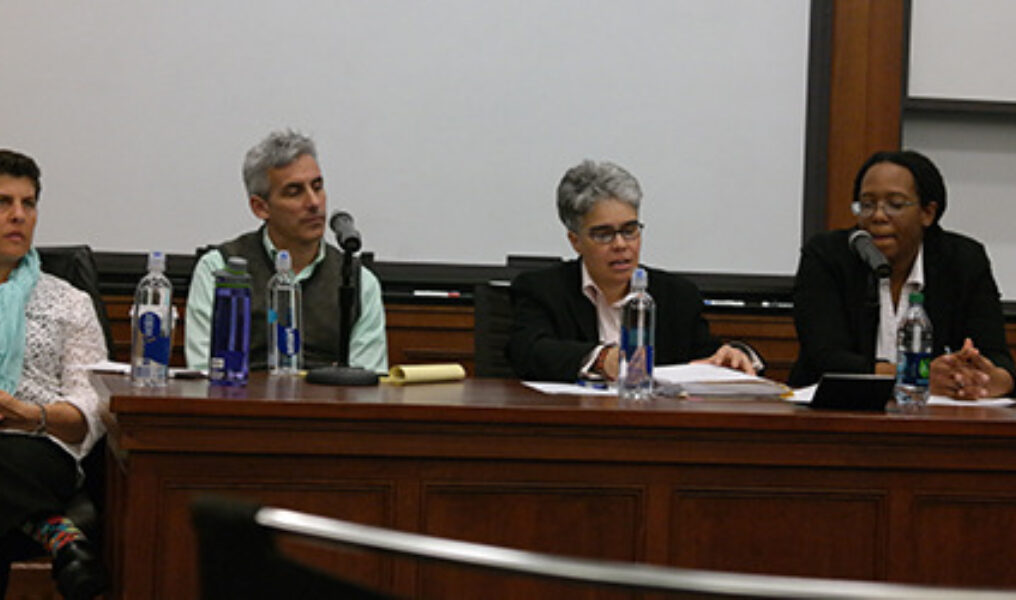BY AJ TRAGER

Panelists (L-R) Lisa Ruby, Jay Kaplan, Angie Martell and S. Kerene Moore discussing the future of LGBT issues post-SCOTUS on April 15 at the University of Michigan Law School. BTL Photo: AJ Trager
ANN ARBOR — The U.S. Supreme Court will hear arguments regarding the constitutionality of legal recognition of same-sex marriage April 28. In the event that the high court issues an affirming decision, thousands of same-sex couples who have been waiting years (even decades) to get married will finally walk down the aisle and have access to equal opportunities that have been provided to opposite-sex couples for years. However, marriage equality is not the only legal and social fight affecting the LGBT community. Many more changes will have to take place before LGBT individuals hold equal standing under state and federal laws.
In an April 15 conversation held at the University of Michigan Law School, Jay Kaplan, LGBT special projects staff attorney for the ACLU; Lisa Ruby of Michigan Poverty Law Program; and Angie Martell and S. Kerene Moore, co-chairs of the Washtenaw County Bar Association LGBTQ Rights Section, met to discuss the rocky legal road ahead for the LGBT community.
Some in Michigan's legal community have already been working on chipping away at the state's same-sex marriage ban and working to achieve justice for same-sex families. Moore has been able to get a same-sex couple divorced in Washtenaw County and on occasion has been able to get second-parent adoptions for same-sex couples. Some judges are granting annulments, an unfavored avenue for same-sex couples as it doesn't provide the same rights and benefits as divorces. Moore and the panel would prefer to see legal marriage finalized in the state.
"We are having larger and louder conversations in the legal community about how to give same-sex families the access that is much needed. Nobody wants to see children limited to one parent, simply because there is a ban in the state of Michigan," Moore said. "What we are seeing is a movement where many attorneys and judges are doing whatever they can. They are willing to look at alternative legal doctrine so that they can give us status, some legal remedies, give us some access to the courthouse. We are all very excited that the U.S. Supreme Court has decided to take up the DeBoer case because that will clarify matters. That will make (providing legal protections for LGBT individuals) so much easier."
Civil Rights Law
Assuming SCOTUS issues a favorable decision, many systems and policies will need to be changed to include benefits and protections for LGBT individuals. Without adding protections for sexual orientation and gender identity to the Michigan civil rights law, it is still legal for an LGBT individual to be fired from their job, denied housing or denied public accommodations. Kaplan emphasized that amending the state's civil rights law is an imperative that needs swift attention.
Religious Freedom Restoration Acts are popping up all over the country in what Kaplan describes as a "reaction to the reality that marriage equality for same-sex couples is coming" and that this kind of legislation is a "last gasp (for opponents) to try and find a way around this (LGBT equality)." Legislation in Michigan identical to the original RFRA law passed in Indiana has been introduced.
Michigan has already seen examples of discrimination with the pediatrician in Roseville who refused to treat a week-old child because she has lesbian parents, or with the auto mechanic in Grandville who publicly claimed that he would deny services to openly gay people.
A bill that would allow discrimination by adoption agencies that receive state funding is currently working its way through the Michigan legislature. Similar bills have been introduced around the country and LGBT advocates are working to raise awareness of how this type of legislation harms children, not just LGBT parents.
"Michigan pretty much turns over the entire adoption process to adoption agencies," Kaplan said. "These agencies that have been contracted through the state would be able to refuse services to particular families and individuals based on their religious beliefs, even if a particular placement of a child in an adoptive home would be in the child's best interest. That religious belief would supersede what is in the best interest for the child."
Identity And Multiple Licenses
Aside from the lack of civil rights protections, Michigan has many policies that are very harmful to transgender people. The state makes it incredibly difficult for transgender individuals to get accurate state issued identity documents and has one of the strictest policies in the country for aligning government issued documents with gender identity. Michigan requires that a transgender person have surgery before their gender marker can be changed on their birth certificate.
In reality, only 25 percent of transgender people obtain surgery because it's expensive, health insurance won't pay for it and/or many times it can be medically dangerous, Kaplan says. If born in another state that doesn't allow a birth certificate to be changed under any circumstances, such as Idaho, Ohio or Tennessee, a transgender person can never have a state ID card or driver's license that accurately reflects who they are.
"A lot of things are going to be clarified, especially regarding divorce, custody, parenting, visitation and support. These rights are going to be pretty clear for those who are planning on getting married or are already married. We do expect there to be other impacts," Moore said.
The most direct impact is going to be for those who are planning on obtaining marriage licenses or who have already obtained one out of state or out of country.
Ruby specializes in public benefits that come from state or federal office applications. These benefits are allocated by who is considered in a "group." Who is in a group determines what benefits can be distributed and whose assets count. Any same-sex couple living in the state who is married, and not among the 323 couples legally married in the state last year, was never considered married under Michigan law and is not a member of that group receiving marriage benefits.
Due to the varying laws around the country, some couples have been married multiple times. An upcoming issue, in the result of an affirming SCOTUS decision, is determining which one of those marriages holds the most legal weight. State agencies will soon look at name changes, joint rights of survivorship, estate planning and what monetary benefits or penalties can be applied from all the years couples have been married or together.
Social Security has two different programs: one that is needs based with income and assets, and one that is not which includes retirement, survivors and disability insurance, Ruby said. Money is paid in and then when something happens, the money can be taken out; without a marital status, a partner cannot collect on those benefits. If a couple is not legally married and one or both parties reaches retirement age, the other partner is unable to access their partner's retirement benefits. The same thing happens if one half of the couple dies; the status of the marriage is not legally recognized and hospital visitation rights, for example, can be denied to the surviving spouse. Many of these benefits will be redistributed in the event of nationwide same-sex marriage.
Social Security has tried to keep up with the influx of same-sex marriages and is currently encouraging people to apply for benefits now if they've been legally married, but their marriage hasn't been recognized in their state of residence.
Predictions And Scrutiny
"I predict: June 26 at 4:30 p.m. there will be a decision. And I predict that marriage will be available nationwide. The issue, however – and this is what I think we all need to focus on – is: will the court expand the level of scrutiny using an equal protection analysis to determine whether gay and lesbian people are to be a discrete minority and eligible for the criteria for heightened scrutiny analysis? If this is the case, it will be a revolution. It would allow for LGBT issues to be discussed as a protected class for the first time," Martell said.
Kaplan mirrored Martell's thoughts on the SCOTUS ruling.
"I don't know the exact date, but I tend to agree. I think we will have a favorable decision from the U.S. Supreme Court and finally have some finality on the marriage issue for all 50 states," Kaplan said.
Any possible outcome prediction is, at this point, reading tea leaves. The justices' history will have to speak for them until they issue a final decision by the end of June.
Levels of scrutiny include strict scrutiny, where the government must show the challenged classification serves a compelling state interest and is necessary to serve that interest such as race or religion; middle-tier scrutiny, where the government must show that the challenged classification is at least substantially related to the interest; and minimum scrutiny level, where the government must show that the challenged classification is rationally related to serving state interest.
"We've been denied equal participation in an institution that gives legal expression and protection to people. That is second class citizenship. So for me, the first question is an easy one," Martell said in discussing one of the two questions the justices will explore on April 28: Does the 14th Amendment require a state to license a marriage between two people of the same sex?
Martell is concerned that there hasn't been a change in heightened scrutiny since 1970, and even then the courts only gave it a quasi-suspect classification, she said. After 1970, many groups rejected the heightened scrutiny analysis because, "Justice Phelps thought the floodgates would open and there wouldn't be any distinguishing factors from race," Martell explained.
The U.S. Supreme Court has never explicitly set a standard regarding sexual orientation. Martell believes that LGBT issues are Justice Kennedy's legacy. He ruled in favor of LGBT rights in Lawrence v. Texas and Windsor v. The United States. Kennedy's ruling in Windsor says, "To single out a class of persons and exclude them from a vital institution on a basis of classification alone imposes a disability on the class."
"When the states came into the business of marriage, it was a registration to figure out how many people were married. But when they extended the plethora of benefits to people because of marriage, it created a right," Martell said.










